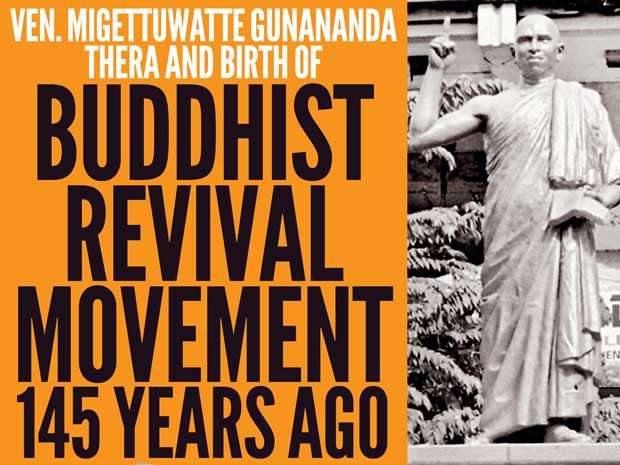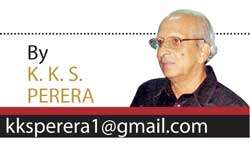29 May 2018 - {{hitsCtrl.values.hits}}

 Miguel Silva who later became silver-tongued scholar monk Ven. Migettuwatte Gunananda Thera, was born on February 9, 1823 at Balapitiya.He studied Christianity, Latin and English at Wesley College, Colombo before serving in the Editorial Board of Ceylon Observer as a layman. The redoubtable controversialist, passed away at Kotahena Deepaduttarama, in the morning of September 21, 1890, at the age of 67.
Miguel Silva who later became silver-tongued scholar monk Ven. Migettuwatte Gunananda Thera, was born on February 9, 1823 at Balapitiya.He studied Christianity, Latin and English at Wesley College, Colombo before serving in the Editorial Board of Ceylon Observer as a layman. The redoubtable controversialist, passed away at Kotahena Deepaduttarama, in the morning of September 21, 1890, at the age of 67.
When the Dutch invaded Ceylon in 1650s, their Missionaries targeted Catholics more than Buddhists. They publicly declared that Buddhist, Hindus, Muslims and Catholics were not fit to hold state office; and in 1711, they framed laws, banning the practice of Hinduism and Buddhism, naming them as ‘cannibal-faiths’.
A comprehensive account of all eight speeches delivered at the world famous debate, the ‘Panaduraa Waadaya’ held on August 26 and 28, 1873 , was published two years later under ‘Buddhism and Christianity Face-to-Face’ by Dr. James Martin Peebles, Ph D. in America.
Several scholarly Christian Missionary priests and Migettuwatte Gunananda Thera assisted by a team of Buddhist scholar monks took part in the debate. The Christian team included Wesleyan priests [Methodist], who were well versed in Buddhist chronicles; of them, William Harvard authored books in Sinhala; B. Clouch, the editor of Sinhala-Pali Dictionary; D.J. Gogerly, a Buddhist scholar and Spence Hardy, a writer in Sinhala literature and Buddhism.
Work of Missionaries
Dutch rulers discouraged the practice of other religions including Catholic faith by introducing several Draconian laws: special privileges were accorded to Protestants. Catholic marriages registration was brought under Protestant priests and the fee was enhanced by a huge margin. This forced Catholic priests, Gonsalvass, John de Vass, to seek refuge in the Kandyan Kingdom.
“…thousands of Sinhalese after learning English had become Christians in order to gain their livelihood. A Sinhalese villager could be trained to attack Buddhism within a year, and in those days a salary of Rs. 20 a month was enough to make him offer his services as a Catechist to preach in the villages against other religions…” -Anagarika Dharmapala
Col. Henry Olcott and Dr. Peebles
“J M Peebles 1822-1922 the President of Psycho-Therapeutic Society of London and a member of similar bodies dedicated to the pursuit of esoteric and arcane subjects…. A large audience estimated at five to seven thousand thrilled to the cut and thrust and party of the disputant, and in a period given to developing confrontations between Christianity and resurgent Buddhism, this particular debate excited much interest and produced the greatest impact. Dr. Peebles on his third visit to the island in 1897 teamed up with Col. Henry Olcott, [1880-1906] whom he had known for almost twenty five years in promoting Buddhist revivalist movement in Ceylon…” – H. A. I. Goonetilleke-- Images of Sri Lanka through American Eyes: - [1983: pp-236].
The debate
‘Ceylon Times’ special reporter on the first day’s proceedings,
‘…long before the hour, thousands of natives were seen wending their way, attired in their gayest holiday suites, in to the large enclosure in which stood the ample bungalow where the adversaries were to meet. By seven the green was one sea of heads. Each district has sent its quota of villagers, and Colombo was represented by a few intellectual looking, silk garbed young Sinhalese, determined to give up all for the great champion of Buddhism .The Protestant party, too was very strong. From Monday, catechists and clergymen of every denomination, Baptists, Wesleyan and Church Missionary, flocked from all parts of the island into the large house prepared for them… the temporary building at the scene of this polemical strife, was a neat cadjan-roofed structure with a raised platform, and parted in the middle; one portion was occupied by the Rev. David de Silva and his party, and the other by the Migettuwatte Thera along with several learned Nayake Bikkhus…’.
On one side of the hall were Reverends David, S. Coles, Catechist F. S. Sirimanne, C. Jayasinghe, P. Rodrigo, R. Tebb, S. Lagden, Joe Fernando, Juan de Silva, J. H. Abhayasekera, Nathanielsz, G. J. Gunasekera, Dr. Staples, and Proctors Jayasinghe, Daniel and Alwis, Mudaliyar de Soysa, and Hunupola Nilame.
On the other side of the stage were Ven. Mohottiwatte Gunananda Thera, Ven. Hikkaduwe Sri Sumangala, Waskaduwe Sri Subhuti Thera , Ven. Potuvila Indrajoti, Ven. Koggala Sanghatissa, Ven. Talhene Amaramuli, and Ven. Mulleriyawe Guneratana.
Rev. David de Silva, a Sinhala Pastor of the Wesleyan Mission at Panadura opened the debate for Christians. He argued on ‘soul’ according to Buddhist and Christian teachings— the Pali/Sanskrit scholar, rose to speak as clock struck 8 on August 26, 1873. Speaking fluently in Sinhala, he quoted from Buddhist scripts. He said, “the ‘doctrine of Dhamma’ is centered on Soul according to Buddhism; Satta, sentient beings are constituted in the five Khandhas, namely, rupakkhanda the organized body, vedanakhanda the Sensations, sannakhanda the perceptions, sankharakhanda the reasoning powers, and vinnanakhanda consciousness”. In proof of his claim, he quoted from Samyukktha Nikaya a section from Sutra pitake. –‘Panchimebikkhave khande dessisami panchaupadhanakhanda etamsunata. Katame ca bikkhave panchakkhanda yam kimchi bikkhave ruupam….’
The Ceylon Times CT, [later Times of Ceylon], and Ceylon Observer sent special reporters to cover the event; debate received wide coverage in the local Press; they were obligatory to observe rules laid down on fair reporting. However, it appears that the Observer was biased towards Christians. On Sep 5, 1873 issue of CT, the writer came across a Letter to the Editor, by one Dr. George Elliot, a reader challenging Observer Correspondent for an ‘…utterly unfounded’ comments reported as,
‘…Migettuwatte had to give into his superior in Pali,Rev. Fr. David Silva, on three very material points…the priest lingered and still lingers along with his confreres, to attempt to answer…”
When the Dutch invaded Ceylon in 1650s, their Missionaries targeted Catholics more than Buddhists. They publicly declared that Buddhist, Hindus, Muslims and Catholics were not fit to hold state office
The debate revolved around the concepts ranged from God, Karma, Nirvana, Soul, Rebirth, and the doctrine of Dependent Origination. Rev. de Silva argued on the concept of no soul or irreducible ‘self or Aatma’ in Buddhism, quoting Tripitaka…
Rupam bhikkhave anattam, yadanattam n’etam mama n’eso ‘hamismin esoattati., [Organized form, monks is not self, that which is not self is not mind, I am not that, that is not to me a soul]. He argued that this means that there is no fundamental difference between human and the rest of the animals. He argued that there would be no rewards or punishments following death for what one has done in this life. If there is no soul or athma, one would have nothing to fear if one commits sin. He quoted the Bible to affirm that we do have souls.
Migettuwatte Thera replying took a swipe at Rev. David’s authority in the Pali language, proposing that someone who makes vital errors in it cannot be likely to comprehend of metaphysics explained in it. The prelate continued to make clear how rebirth works according to Buddhism in the absence of a ‘soul’: that there is some kind of continuity, that goes beyond the demise of the physical body.
He charged that some translators of the Bible have committed various tricks like interpreting ‘jealous’ into Sinhalese jwalita, which in fact means glittering or shinning. Also of leaving out stanzas like Leviticus 17:7, saying, they should not make offerings to various divine beings that they have prostituted themselves to. He concluded by appreciating Catholics who have not rewritten their Bibles in the style of some Protestants.
Many others believe so, but a broad study of the eight speeches made by the scholars create a doubt who won and who lost; The Dhamma, as professed by the Buddha is not an ideology, a doctrine, or a philosophy; it is the truth and reality, no mundane effort by an erudite scholar, as long as he stands on the pratajjana pedestal, cannot prove or disprove it. Like in Cricketing parlour what is important here is not ‘who won and who lost, but to judge how the debate was conducted; and the impact of it on vicious elements and the final outcome.
In 1991, President R. Premadasa writing a foreword to Prof. Wimal Abeyasundera’s book on Panadura Debate says: “The most valuable lesson we could learn from the debate is the peaceful way of settling disputes”.
05 Jan 2025 1 hours ago
05 Jan 2025 1 hours ago
05 Jan 2025 1 hours ago
05 Jan 2025 2 hours ago
05 Jan 2025 3 hours ago